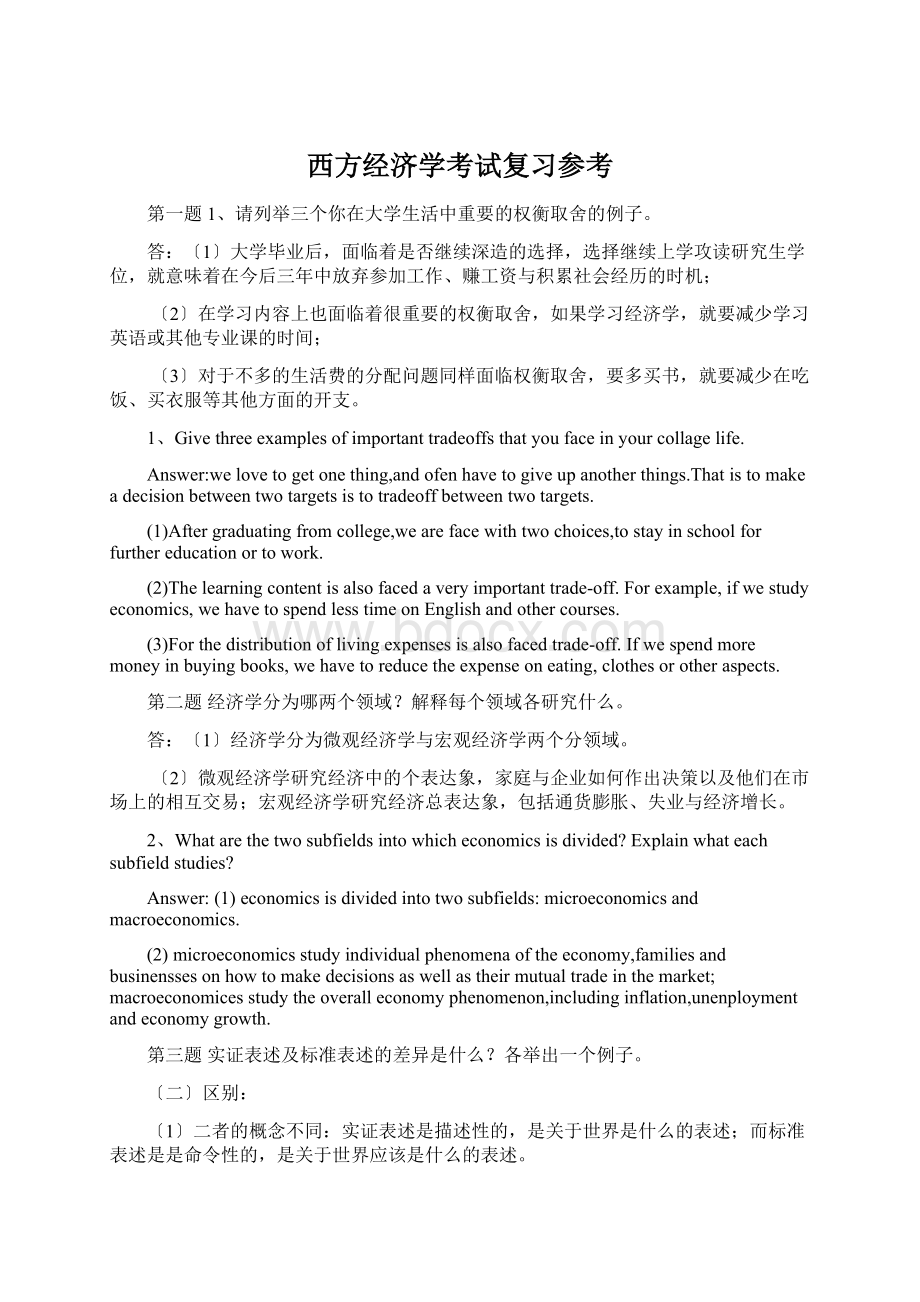西方经济学考试复习参考.docx
《西方经济学考试复习参考.docx》由会员分享,可在线阅读,更多相关《西方经济学考试复习参考.docx(7页珍藏版)》请在冰豆网上搜索。

西方经济学考试复习参考
第一题1、请列举三个你在大学生活中重要的权衡取舍的例子。
答:
〔1〕大学毕业后,面临着是否继续深造的选择,选择继续上学攻读研究生学位,就意味着在今后三年中放弃参加工作、赚工资与积累社会经历的时机;
〔2〕在学习内容上也面临着很重要的权衡取舍,如果学习经济学,就要减少学习英语或其他专业课的时间;
〔3〕对于不多的生活费的分配问题同样面临权衡取舍,要多买书,就要减少在吃饭、买衣服等其他方面的开支。
1、Givethreeexamplesofimportanttradeoffsthatyoufaceinyourcollagelife.
Answer:
welovetogetonething,andofenhavetogiveupanotherthings.Thatistomakeadecisionbetweentwotargetsistotradeoffbetweentwotargets.
(1)Aftergraduatingfromcollege,wearefacewithtwochoices,tostayinschoolforfurthereducationortowork.
(2)Thelearningcontentisalsofacedaveryimportanttrade-off.Forexample,ifwestudyeconomics,wehavetospendlesstimeonEnglishandothercourses.
(3)Forthedistributionoflivingexpensesisalsofacedtrade-off.Ifwespendmoremoneyinbuyingbooks,wehavetoreducetheexpenseoneating,clothesorotheraspects.
第二题经济学分为哪两个领域?
解释每个领域各研究什么。
答:
〔1〕经济学分为微观经济学与宏观经济学两个分领域。
〔2〕微观经济学研究经济中的个表达象,家庭与企业如何作出决策以及他们在市场上的相互交易;宏观经济学研究经济总表达象,包括通货膨胀、失业与经济增长。
2、Whatarethetwosubfieldsintowhicheconomicsisdivided?
Explainwhateachsubfieldstudies?
Answer:
(1)economicsisdividedintotwosubfields:
microeconomicsandmacroeconomics.
(2)microeconomicsstudyindividualphenomenaoftheeconomy,familiesandbusinenssesonhowtomakedecisionsaswellastheirmutualtradeinthemarket;macroeconomicesstudytheoveralleconomyphenomenon,includinginflation,unenploymentandeconomygrowth.
第三题实证表述及标准表述的差异是什么?
各举出一个例子。
〔二〕区别:
〔1〕二者的概念不同:
实证表述是描述性的,是关于世界是什么的表述;而标准表述是是命令性的,是关于世界应该是什么的表述。
〔2〕二者判断其正确性的方法不同:
实证表述与标准表述的主要差异是我们如何判断他们的正确性。
从原那么上说,我们可以通过检验证据而确认或否认实证表述〔如经济学家要评估上述实证表述的例子,可以通过分析最低工资数据的变动以及不同时间段而导致的失业状况的变化来判断〕;
而标准表述的判断不仅涉及事实数据,还要涉及价值观的问题〔如要评估上述标准表述的例子,就不能仅仅通过事实数据,还要考虑道德标准、宗教信仰、伦理哲学〕。
〔还要考虑道德标准、伦理哲学等价值观问题。
〕
Answer:
(A)Forexample:
Positivestatements:
Minimumwagelawscauseunemployment.
Normativestatements:
Thegovernmentshouldraisetheminimumwage.
(B)Thedifferences:
①Thedifferencebetweenthetwoconcepts:
Positivestatementsaredescriptive,claimsabouthowtheworldis;Andnormativestatementsarecommands,claimsabouthowtheworldoughttobe.
②twodifferentmethodstodetermineitscorrectness:
Positivestatementsandnormativestatements,themaindifferenceishowwejudgetheirvalidity.Inprinciple,wecanconfirmorrefutepostivestatementsbyexaminingevidence(suchaseconomistsmightevaluatetheabove-mentionedexamplesofpositivestatementsbyanalyzingdataonchangesinminimumwagesandchangesinunemploymentovertime);Thenormativestatementsofthejudgenotonlyfactualdata,butalsoissuesrelatedtovalues(forexample,toevaluatethenormativestatementsoftheaboveexamples,wecannotsimplybythefactthatthedata,butalsoconsidertheethics,religious,politicalphilosophy.).
第四题为什么决策者应该考虑鼓励问题?
答:
〔1〕鼓励:
是一种引起需要,激发动机、指导行为有效实现目标的心理活动过程。
通俗理解:
调动个体行为积极性。
〔2〕因为人们通过比拟本钱及收益来做决定,所以他们的行为也会随着本钱及收益的变化而变化。
也就是说,人们会对鼓励做出反响。
公共决策者应该从不忘记鼓励,如果政策改变了鼓励,改变了及人们自身相关的本钱及收益,那么它将使人们改变自己的行为;
〔3〕当决策者未能考虑到行为如何由于政策的原因而变化时,他们的政策往往会产生意想不到的效果。
政策往往可能会产生一些人们没有明显预想到的影响。
当分析任何政策时,都要不仅考虑到它的直接效果,而且要考虑到它通过鼓励产生的间接效果。
如果政策改变了鼓励,它将使人们改变自己的行为。
所以作为决策者应该充分考虑鼓励问题。
Answer:
(1)incentive:
arisetotheneedsofthemotivationalandguidebehaviortoachieveitsobjectivesandeffectiveprocessofmentalactivity.Popularunderstand:
tomobilizetheenthusiasmofindividualbehavior.
(2)Becausepeoplemakedecisionsbycomparingcostsandbenefits,theirbehaviormaychangewhenthecostsorbenefitschange.Thatis,peoplerespondtoincentives.Publicpolicymakersshouldneverforgetaboutincentives,ifthepolicychangeincentives,tochangethepeoplethemselvesassociatedwiththecostsandbenefits,thenitwillallowpeopletochangetheirbehavior;
(3)Whenthepolicymakersfailedtoconsiderhowtheirpoliciesaffectincentives,theyoftenendupwithresultstheydidnotintend.Policiescanhaveeffectsthatarenotobviousinadvance.Whenanalyzinganypolicy,wemustconsidernotonlythedirecteffects,butalsotheindirecteffectsthatworkthroughincentives.Ifthepolicychangesincentives,itwillcausepeopletoaltertheirbehavior.Therefore,aspolicymakersshouldtakefullaccountofincentiveproblems.
第五题什么因素决定买者对某一物品的需求量
1.价格。
一个决定因素便是——价格。
需求量随着价格的上涨而下跌。
需求量及价格之间呈反比关系。
在其他条件一样,当一种商品的价格上升,需求量就会下降。
当价格下降时,需求量上升。
除了价格之外,还有其他因素影响着需求量。
2.收入。
收入低意味着你的总花销要减少,那么在日常必需品上的开销就要减少。
如果因为收入减少而导致对某些物品的需求量减少,这类物品就被称作是normalgood.如果因为收入的减少导致对某些物品的需求量增加,这类物品就被称为是inferiorgood.
3.相关商品的价格。
当某一物品价格下降导致另外一种物品需求量的减少,这样的物品叫做代替品。
当替代品的价格上升时,该物品的需求量就会增加。
反之,那么会减少。
当某一物品价格下降导致另外一件物品的需求量增多,这样的物品叫做补充品。
当补充品的价格上升时,该物品的需求量就会减少。
反之,那么会增加。
4.税收。
如果某一物品的价格不变,而政府提高了人们在购置该物品时的税收,那么该物品的需求量就会减少。
反之,该物品的需求量就会增大。
5.预期。
你对未来的预期可能会影响你对今天的产品或效劳的需求。
如果你预期明天价格会上升,你可能更愿意今天在这样一个价格下去购置,但是如果你预期明天的价格下降,你可能不太愿意购置。
6.购置者人数。
当购置者数量增加时,该物品的市场需求量将会增加。
果。
如果政策改变了鼓励,它将使人们改变自己的行为。
所以作为决策者应该充分考虑鼓励问题。
5.Whatdeterminesthequantityofagoodthatbuyersdemand?
1.Price.Onedeterminantplaysacentralrole—thepriceofthegood.Thequantitydemandedfallsasthepriceriseasthepricefalls.Thequantitydemandedisnegativelyrelatedtotheprice.Otherthingsequal,whenthepriceofagoodrises,thequantitydemandedofthegoodfalls,andwhenthepricefalls,thequantitydemandedrises.
Inadditiontothepriceofgoods,thereareotherfactorsthatinfluencedemand.
2.Income.
Alowerincomemeansthatyouhavelesstospendintotal,soyouwouldhavetospendlessonsome–andprobablymost–goods.Ifthedemandforagoodfallswhenincomefalls,thegoodiscalledanormalgood.Ifthedemandforagoodriseswhenincomefalls,thegoodiscalloninferiorgood.
3.Priceofrelatedgoods.
Whenafallinthepriceofonegoodreducesthedemandforanothergood,thetwogoodsarecalledsubstitutes.Whenafallinthepriceofonegoodraisesthedemandedforanothergood,thetwogoodsarecalledcomplements.Whenthecomplementsofthepriceofgoodsrise,itistoreducedquantitydemanded.Onthecontrary,itincreaseddemand.
4.Taxes.Ifthepricesofgoodsunchanged,whilethegovernmenthasraisedpeople’staxeswhenyoupurchaseit,thenthedemandforgoodswillbereduce.Onthecontrary,itwillbeincrease.
5.Expectations.
Yourexpectationsaboutthefuturemayaffectyourdemandforagoodorservicetoday.Ifyouexpecttothepriceofonegoodtorisetomorrow,youmaybemorewillingtobuyitattoday’sprice,butifyouexpectthepriceofonegoodtofalltomorrow,youmaybelesswillingtobuyit.
6.Numberofbuyer.
Whenthenumberofbuyerofbuyersincrease,thequantitydemandedinthemarketwouldbehigherateveryprice.
第六题列举并解释决定需求价格弹性的主要因素。
需求价格弹性是指,需求量对价格的影响。
根据经历,我们可以看出什么决定需求价格弹性的一般规那么。
1.性能相似的替代品。
具有性能相似性的替代品的物品的需求价格弹性更大一些,因为消费者可以更容易的去选择替代品来到达自己的目的。
2.必需品及奢侈品。
必需品一般需求价格弹性小,而奢侈品的需求价格弹性大。
当生活必需品的价格上涨时,人们不会明显改变对必需品的需求数量。
相反,当奢侈品的价格上涨时,对奢侈品的需求量会大幅度下降。
3.对市场的定义。
狭义上的市场往往比广义的市场需求更具有弹性,因为它更容易找到替代品。
4.时间范围。
商品往往在较长的时间范围内具有弹性。
〔当汽油上涨,汽油的需求量在最初的几个月只是轻微下降,。
随着时间的推移,人们购置更省油的汽车,改乘公共交通,并搬到离他们的工作地点更近的地方。
几年内,汽油的需求量大幅度下降。
〕
物品往往随着时间变长而需求更富有弹性。
因为在长期中人们有充分的时间来改变自己的消费嗜好与消费构造。
6.Listandexplainsomeofthedeterminantsofthepriceelasticityofdemand.
Thepriceelasticityofdemandedmeasureshowmuchthequantitydemandedrespondstoachangeinprice.Basedonexperience,wecanstatesomegeneralrulesaboutwhatdeterminesthepriceelasticityofdemand.
1.Availabilityofclosesubstitutes.
Goodswithclosesubstitutestendtohavemoreelasticdemandbecauseitiseasierforconsumerstoswitchfromthatgoodtoothers.
2.Necessitiesversusluxuries.
Necessitiestendtohaveinelasticdemand,whereasluxurieshaveelasticdemands.Whenthepriceofnecessitiesrises,peoplewillnotdramaticallyalterthenumbersofnecessities.Bycontrast,whenthepriceofluxuriesrise,thequantityofluxuriesdemandedfallssubstantially.
3.Definitionofthemarket.
Narrowlydefinedmarketstendtohavemoreelasticdemandthanbroadlydefinedmarkets,becauseitiseasiertofindclosesubstitutesfornarrowlydefinedgoods.
4.Timehorizon.
Goodstendtohavemoreelasticdemandoverlongertimehorizons.〔Whenthepriceofgasolinerise,thequantityofgasolinedemandedfallsonlyslightlyinthefirstfewmonths.Overtime,however,peoplebuymorefuel—efficientcar,switchtopublictransportation,andmovecloserwheretheywork.Withinseveralyears,thequantityofgasolinedemandedfallssubstantially.〕
Objectsovertimeisoftenlongeranddemandmoreelastic.Becauseinthelongrun,peoplehaveenoughtimetochangetheirspendinghabitsandconsumptionstructure.
第七题如果需求是富有弹性的,价格上升会如何改变总收益,请举例说明。
1、如果需求是有弹性的,价格上升就会使总收益减少。
Ifdemandiselasitic,theincreasingofpricewilldecreasetotalrevenue.
2、从弹性需求曲线中可以看出,需求曲线富有弹性,在这种情况下,价格上涨引起的需求量减少的比例更大,总收益就会减少。
Withanelasticdemandcurve,anincreseinthepriceleadstoadecreaseinquantitydemandedthatisproportionatelylarger.Thus,totalrevenuedecreses.
Forexample,ifpricerisesfrom4dollarsto5dollars,whichcausesthequantitydemandtoreducefrom50to20,thetotalrevenueisreducedfrom200dollarsto100dollars.
第八题谈谈你对最低工资法的看法。
1、最低工资法是政府人为干预劳动市场的一种方式。
Minimumwagelawsisawaythatgovernmentinterventionthelabormarket.Suchaninterventionwouldimpedethespontaneousoperationofmarketmechanisms.
2、人为规定的最低工资高于劳动力市场的均衡工资,就会减少对劳动力的需求,结果是失业人数反而增加。
Butiftheminimumwageishigherthanequilibriumwage,itwouldreducethedemandoflabor,andtheunemploymentincreasesonthecontrary.
3、所以,不仅实施最低工资法对减轻贫困没有帮助,而且会扭曲资源配置
Therefor,notonlytheimplementationoftheminimumwagelawsforlighteningpovertyisnotuseful,butalsodistortstheallocationofresources.
第九题列出国内生产总值的四个组成局部,各举一个例子。
(例子大家可以参考书本第十章)
国内生产总值分为四个局部:
消费,投资,政府支出与净出口。
〔1〕消费。
消费是指家庭花费在商品与效劳上的费用。